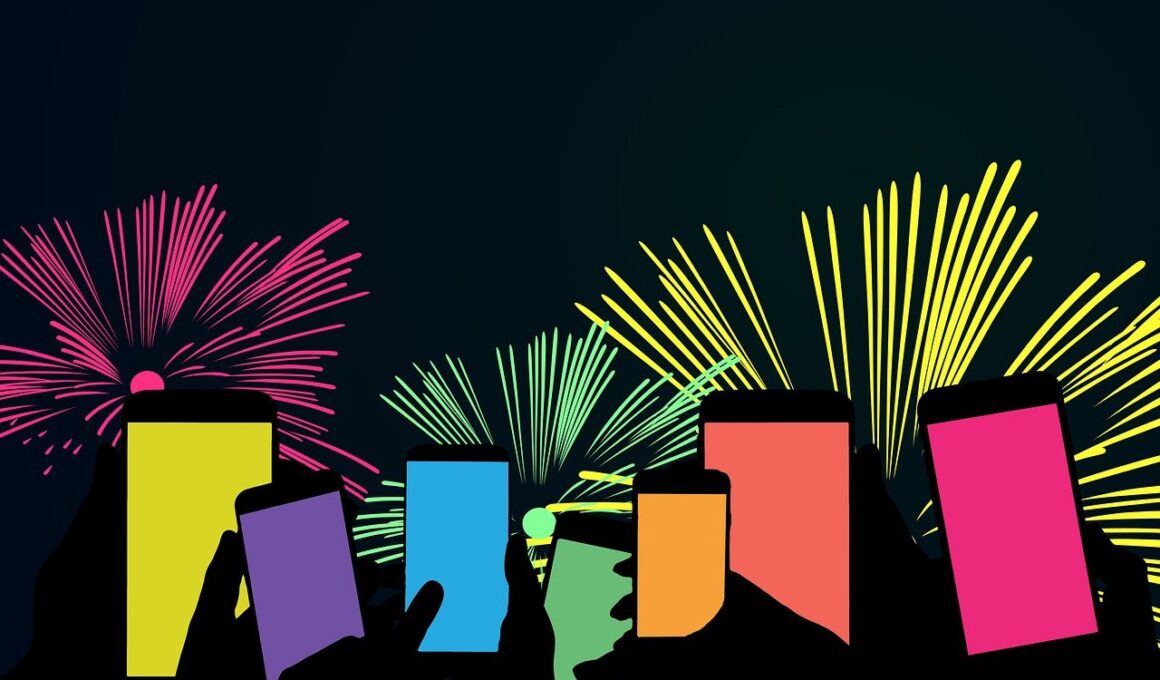Using AR-Powered Social Contests to Boost Event Follower Engagement
In the current digital landscape, businesses are increasingly looking for novel ways to engage with their audience. One such method involves using augmented reality (AR) tools within social media campaigns. By integrating AR into event marketing efforts, businesses can create dynamic experiences that captivate and involve participants. For instance, AR applications can overlay interactive graphics in the real world, which users can capture through their mobile devices. This approach not only elevates user interaction but also fosters community spirit and excitement around the event. Through features like gamification, events can incorporate AR challenges to boost online engagement. Participants could, for example, scan certain objects or locations to unlock rewards and recognition, enhancing their overall experience. The shared content generated through these interactions can significantly amplify reach and visibility on various social media platforms, thereby attracting a larger audience. Companies should consider investing in intuitive AR development combined with a well-structured social media strategy. Posts can drive traffic to these interactive experiences, leading to increased follower retention and a vibrant event atmosphere. Ultimately, AR-driven initiatives can transform conventional events into extraordinary experiences seamlessly.
One of the key advantages of implementing AR-powered contests is the ability to efficiently track user engagement. Metrics such as participation rates, shares, and interactions can be easily monitored through social media analytics tools. Businesses can leverage these insights to optimize future campaigns and tailor their content according to audience preferences. Furthermore, incorporating elements of competition can spur interest in events, as users are often motivated by the chance to win prizes or gain visibility among peers. By promoting these contests across social media platforms, businesses can create a buzz surrounding their event, resulting in organic reach. Hashtags specifically designed for the campaign can serve as a rallying point for participants to share their experiences and connect with one another. This also allows brands to establish a dedicated online community, promoting ongoing interaction even after the event. The emotional response elicited through friendly competition fosters loyalty, as participants feel personally invested in the brand’s success. By utilizing user-generated content, organizations can drive social proof and credibility, making AR contests a potent tool in event marketing campaigns.
Creating Memorable AR Experiences
A critical aspect of successful AR contests lies in crafting memorable and impactful experiences. Content should be carefully designed to resonate with the target audience, making AR interactions not only fun but also meaningful. For example, aligning AR challenges with event themes can enhance connection and excitement. Furthermore, incorporating storytelling elements can engage emotionally, ensuring that participants feel invested beyond mere competition. Users should feel a sense of accomplishment once they complete AR tasks—whether that means unlocking hidden items or capturing unique visuals. Providing rewards that are desirable, such as discount codes or exclusive merchandise, can further incentivize participation. Visual appeal is equally crucial; vibrant and engaging AR designs can capture attention, enticing users to participate in various challenges. Additionally, improving the accessibility of AR experiences can significantly impact participation. Consumers should find these interactions easy to engage with, regardless of their familiarity with the technology. Simple instructions and easily available AR apps can draw in varied demographics, making the event accessible and enjoyable for all. Implementing creative visuals and user-oriented designs ensures AR contests leave lasting impressions, making the event memorable.
Promoting AR contests effectively is another comprised strategy to enhance follower engagement for events. Utilizing influencers within the niche can greatly amplify campaign reach. Partnering with social media personalities who align with the event’s target audience can initiate conversations and excitement about the AR features, as they often possess loyal followings eager to engage in activities they endorse. Moreover, teasers showcasing the unique aspects of the AR contest can generate anticipation among potential attendees. Highlighting previous successful campaigns and utilizing testimonials from past participants can play a crucial role in building credibility. Marketing materials, including eye-catching graphics and appealing videos, should be utilized to illustrate how participants can engage with AR elements, making it easy for users to understand the benefits of joining. Clear, concise calls to action (CTAs) should direct followers on how to participate. Campaigns should also be promoted across multiple platforms, facilitating greater exposure for the event. Creating a cohesive strategy to unify messaging across spaces cultivates a consistent brand voice, attracting diverse audiences and maximizing engagement. Accordingly, ensuring that promotional efforts effectively harness the potential of social media will significantly impact event success.
Analyzing the Impact of AR on Engagement
As organizations invest in using AR technology for event promotions, analyzing its impact is crucial. Collecting and assessing data from AR engagements can provide valuable insights into audience behavior patterns and preferences. Through measuring growth in followers, increased content shares, and higher participant counts, businesses can gauge the effectiveness of AR-powered initiatives. Utilizing baseline metrics prior to launching these campaigns allows for straightforward comparison after launches. Surveys and feedback can additionally provide subjective insights into user experiences, giving a full perspective on how participants value AR contest initiatives. Gathering this information not only informs future campaigns but also provides the chance for real-time optimization. Businesses can respond to feedback quickly, fine-tuning content and messaging to better align with audience expectations. By employing analytical tools, organizations can create comprehensive reports detailing the influences of AR on follower engagement, ensuring that strategies can evolve alongside emerging trends. Consequently, understanding the direct correlation between AR experiences and audience growth can reinforce the significance of innovative approaches in event marketing.
Furthermore, ensuring that AR campaigns remain engaging beyond the event itself can deepen follower interaction and promote longevity. Businesses can consider creating post-event follow-ups, perhaps maintaining the excitement with ongoing activities or challenges. Continuing to offer AR experiences, even after the excitement of the event has settled, encourages participants to remain involved and coming back for more. Engaging participants with regular content can shift attention from passive to active consumption. It opens opportunities for brands to showcase updates, behind-the-scenes glimpses, or exclusive features that keep audiences interested. For instance, providing AR-generated imaging showcasing event highlights can sustain awareness and capitalise on momentum. Video recaps can also serve to keep the audience excited about potential future events. Ensuring communication channels—like newsletters or social media posts—remain active helps build a community around the brand that users want to stay connected with. Overall, sustaining engagement is integral to an effective post-event strategy that maximizes the impact of AR interactions designed to captivate audiences. Hence, smart deployment of resources here ensures long-term follower satisfaction.
Future Trends in AR and Social Media Events
As technology continues to evolve, the future of AR in social media events promises even more innovative opportunities. Continuous advancements in AR and social media platforms will allow for increasingly seamless user interactions. Emerging tools may integrate elements such as live events enhanced through AR, encouraging real-time participation from remote attendees. This trend could open up new avenues for brands to engage audiences globally by offering live local experiences enhanced with technology. Furthermore, as audiences become more familiar and comfortable with AR, expectations will grow for more immersive and interactive content. Events may integrate machine learning models to understand audience behaviors and preferences, personalizing AR experiences on a larger scale. The fusion of AR with virtual reality (VR) could usher in a new era where events feel physically closer, allowing users to engage as if physically present. Staying ahead of these trends will be crucial for event organizers seeking to maintain relevance in an ever-competitive landscape. The continuous exploration of AR possibilities in social media enables brands to create powerful connections that resonate long after the conclusion of the event.
Ultimately, the integration of augmented reality into social media campaigns offers vast potential, unlocking innovative avenues for follower engagement. By leveraging the interactive qualities of AR, businesses can create memorable experiences that transcend traditional marketing tactics. Engaging audiences through tailored contests not only fosters a community ambiance around events but also provides a tech-savvy approach that modern consumers appreciate. Observing the trends in AR applications informs future marketing strategies that will resonate with audiences eager for new experiences. With well-executed campaigns promoting interactivity, brands can elevate the standard of their events to create lasting impressions that build loyalty. As competition grows in the event landscape, those who adopt and adapt to emerging technologies stand to gain a significant edge in their marketing initiatives. Early adopters of AR can position themselves as forward-thinking industry leaders, influencing trends and setting benchmarks for competitors. Ensuring that there’s a strategic plan for the effective integration of AR can ultimately enhance the efficacy of an event marketing campaign, ensuring participants feel valued and engaged throughout their journey.


